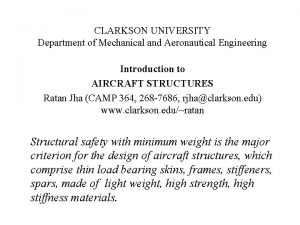The many facets of Engineering AerospaceAeronautical Engineering Aeronautical























- Slides: 23

The many facets of Engineering

Aerospace/Aeronautical Engineering Aeronautical engineers work with aircraft. They are involved primarily in designing aircraft and propulsion systems and in studying the aerodynamic performance of aircraft and construction materials. They work with theory, technology, and practice of flight within the Earth's atmosphere. In order to become an aeronautical engineer, prospective candidates must complete a bachelor's degree program, usually in aerospace or aeronautical engineering, that has been approved by the Accreditation Board for Engineering and Technology (ABET). Programs can take 4 -5 years to complete

Architectural Engineering Businesses, tenants and homeowners expect more from the buildings they work and live in. They want buildings that are energy efficient and more sustainable, comfortable to live and work in, offer more services and are fit for purpose, now and in the future. Architectural engineers help make this happen. The Architectural Engineering major covers the skills you need to develop complex designs that can meet all those needs. From the foundations to the superstructure to the services, you’ll learn how to engineer for high-quality buildings. CAREER OPPORTUNITIES * Architectural design engineer * Building services engineering * Project management * Building Information Management (BIM) specialist

Biomedical Engineering Biomedical engineers combine engineering, medicine, and biology to resolve challenges in the healthcare industry. They respond to challenging problems, and design medical solutions for more effective treatment and quicker recovery. It is a field of rapid diversification, and as the role of technology in healthcare becomes more prominent, biomedical engineers find themselves at the forefront of real world, life-changing outcomes. CAREER OPPORTUNITIES Biomedical engineers often gain employment in biomedical companies, research facilities, hospitals and government regulatory agencies. They design medical devices, prostheses or implants, develop drugs or drug delivery systems, improve sports and injury assessment, and work in medical IT. As some of the most versatile professionals in the field, biomedical engineers can also be found in fields like software development, electronics, consulting, financial modelling, and the food/ meat/wool industries.

Building Engineering Interested in a career where you can engineer buildings? The Building Engineering major in the Bachelor of Engineering Technology focuses on asset and facilities management, building surveying technology and construction safety engineering. Building engineering encompasses core engineering technology knowledge and skills related to construction CAREER OPPORTUNITIES * Health and safety manager * Construction site management * Engineering risk management * Building condition surveyor * Renovation/refurbishment specialist * Valuation surveyor * Building inspector * Facilities/asset management * Building energy management * Commercial property management

Chemical & Materials Engineering Do you wonder how products like petrol, plastic bottles, and synthetic polyester are produced from oil? Or are you more interested in developing new, sustainable replacements for these everyday items? These topics fall under Chemical and Materials Engineering, a discipline that involves understanding how to chemically or physically alter a substrate in order to produce something useful. As “big picture” professionals, these engineers are often responsible for the overall design, operation and quality of giant-scale processes. CAREER OPPORTUNITIES Major industries employing chemical and materials engineers include dairy and food, pharmaceuticals, paper and pulp, petrochemicals, energy processing and production, construction and cement, timber, water treatment, resource development and management, electronics, and mineral processing industries such as aluminium and steel production. As sustainable practices become increasingly critical, chemical and materials engineers will also be required to re-evaluate and redesign many of the fundamental products and processes that these industries have been built upon.

Civil Engineering Civil engineering is a professional engineering discipline that deals with the design, construction, and maintenance of the physical and naturally built environment, including public works such as roads, bridges, canals, dams, airports, sewerage systems, pipelines, structural components of buildings, and railways. CAREER OPPORTUNITIES The demand for civil engineers will soon exceed supply as cities continue to grow, ageing infrastructure needs replacing and the need to rectify human harm to the environment becomes critical. You will find opportunities in state-owned enterprises, in regional and district councils, and as an engineering contractor or consultant in the private sector.

Computer Systems Engineering now pervades almost every aspect of our world. It constitutes the core of controllers and components of wireless communication systems, home automation systems, appliances, automobiles, factory processes, mechatronics, instrumentation, embedded systems and nano-systems. Computer Systems Engineering is a crucial discipline that pushes us to consider practical engineering problems with computer-based solutions, often by embedding a computer system into a complex operation that can sense, problem-solve and act in the real world. CAREER OPPORTUNITIES As innovative design and product development continue at pace, so does the demand for qualified engineers. As a graduate, you will find opportunities in multinational computer companies, consultancy firms, the telecommunications industry, and in the research and development teams of companies in a multitude of sectors. You might extend your Part IV research project, develop a new technology and form your own start-up company.

Construction Engineering Designing safe, cost effective and environmentally sustainable buildings and infrastructure is essential to our society. Professional construction engineers are involved with the design, planning and construction of the physical infrastructure that surrounds us. Whether the project is high-density housing or commercial construction, these engineers design reliable processes and build quality structures that enhance our living and working environments. CAREER OPPORTUNITIES * Construction design engineer * Construction delivery systems * Site engineer * Project and construction management

Cybersecurity Engineering Cybersecurity is at the forefront of modern technology and focuses on protecting and safeguarding computers, networks and data from unauthorised access, attack and damage. You will learn how to recognise these security threats and the practical skills needed to prevent them. Study includes a range of technologybased courses and interdisciplinary courses that include aspects of law, policy, social and human factors, ethics and risk management. CAREER OPPORTUNITIES * Security Analyst * Security Engineer * Security Architect * Security Administrator * Security Software Developer * Cryptographer * Cryptanalyst * Security Consultant

Electrical Engineering Electrical engineers keep the power running for businesses and our communities. Electrical engineering skills are needed in a wide range of industries and you could find yourself working in a lab, on a building project, at a power station or in a workshop. The Electrical Engineering major equips you with the skills to design, implement, and maintain power and utility systems. You also learn about electrical power engineering circuits, process control systems and programmable logic displays. CAREER OPPORTUNITIES * Control system engineer * Lighting and building services engineer * Power systems engineer * Electrical, lighting, building and power industries * Armed Forces

Electronic Engineering Electronic engineers take a look at the appliances and systems that make our daily lives easier – they were created by electronic engineers. Electronic engineers are also involved in robotics research, which relies heavily on using digital systems to control and monitor motors, communications, and sensors. You develop an in-depth understanding of electronic engineering circuits, with a focus on microelectronic systems and their applications in commercial, industrial and domestic systems and appliances. The Electronic Engineering major also covers the design, implementation and maintenance of electronic systems. CAREER OPPORTUNITIES * Electronics engineer * Embedded system engineer * Software engineer

Engineering & Innovation Management Together with a sound technical base (either from a chemical, electronic or mechatronic basis) you will draw on your innovation management and engineering knowledge to analysis and design. You will have strong abilities to effectively manage projects within a commercial environment; utilising your enhanced communicative and facilitating skills, to get the most from finance, sales, marketing, manufacturing and suppliers with the capability to take new products to market. You will also have a strong grasp of the technical challenges companies face, yet with an understanding of what these means in the global commercial world CAREER OPPORTUNITIES Typically you would work in any industry that designs and manufactures products. Companies that could: • Have fewer than 20 employees and generally find it difficult to employ just engineering specialists (i. e. mechanical, electronics, etc. ) and need a specialist who has the technical expertise and commercial acumen • Be a larger company that has a significant pool of internal engineering specialists that need complementary management and commercial capability to direct and integrate small to medium projects

Engineering Science Engineering scientists are problem solvers committed to the science of “better”. They use their intellect and advanced mathematical skills to design ways to optimise and improve systems. How can a forest be managed to make a profit while still remaining environmentally friendly? How can a sail be designed to work in low wind conditions? What prices should be charged for airline tickets to maximise the revenue from a given flight? These are all questions an engineering scientist would relish. CAREER OPPORTUNITIES The diverse range of options available throughout your degree will directly contribute to your professional versatility. You might end up developing software, modelling production processes for a large manufacturer, or perhaps undertake a management position with a bank. Our graduates can be found in leading New Zealand companies like Fonterra, Air New Zealand, and Meridian Energy, in government organisations including NIWA and Transpower, and consultancy firms such as Beca and Maunsell.

Financial Engineering Want to understand the complexity of capital markets? How to manage different types of risks? Interested in studying a challenging technical degree with flexible career opportunities? Financial Engineering is a cross-disciplinary field combining financial and economic theory with the mathematical and computational tools needed to design and develop financial products, portfolios, markets, and regulations. Financial engineers manage financial risk, identify market opportunities, design and value financial or actuarial products, and optimise investment strategies. CAREER OPPORTUNITIES Financial Engineering graduates are ready for the international workplace in the finance and analytics industries. Financial engineers could be involved in derivatives pricing, financial regulation, corporate finance, portfolio management, risk management, trading or structured products. • Financial engineer • Investment broker, investment trader, share broker, financial trader, quant trader • Actuary • Investment analyst • Quantitative research analyst • Risk analyst / manager • Business analyst • Statistical analyst, data scientist • Entrepreneur and CEO

Forestry Engineering Forest engineering is a hybrid of engineering, forestry, and management. It requires people who can combine skills to solve engineering problems in the natural environment, with a focus on balancing economic, societal, and environmental requirements. Forest engineers construct and evaluate the operational systems that make the forest industry ‘work’. This can include: • designing and building new roads • developing or modifying forestry equipment • planning harvest operations • optimising transport logistics • integrating new technologies • supervising employees and contractors • ensuring safety standards are maintained. CAREER OPPORTUNITIES Forest Engineering have been employed as: • Forest engineers • Forest consultants • Project engineers • Civil engineers • Infrastructure engineers • Site managers and more Forest engineers have a broad knowledge and solid technical ability, they are able to work in diverse areas and on a variety of activities such as: • Harvest planning • Forest roading • Forestry equipment • Optimising logistics • Supervising contractors • Developing new forest products • Improving the environment • Geospatial work

Maritime Engineering Maritime engineering is critical. Across the globe a web of offshore infrastructure supports the delivery of oil and gas supplies that power the world’s transportation. Maritime engineers keep these vital vessels and systems working. Through a joint venture with Australian Maritime College (AMC), New Zealand students can now study maritime engineering 1. You start with two years of study at AUT and then transfer to the AMC in Tasmania for your final two years. You then select your chosen field within maritime engineering – marine and offshore engineering, naval architecture or ocean engineering. There is no other programme of this kind in New Zealand. CAREER OPPORTUNITIES Marine and Offshore Engineering * Industrial process and power generation sectors * Survey for government, class societies and insurance Naval Architecture * Shipbuilding – cargo vessels, ferries, naval vessels, ROVs (Remotely Operated Vehicles), sailing, power and mega-yachts Ocean Engineering * Design, installation and management of offshore oil and gas installations * Renewable energy installations * Coastal engineering

Mechanical Engineering Mechanical engineers work with advanced technology across many fields – from transportation to energy systems, home appliances to robotics, manufacturing machinery and processes to medical technologies. In a world where global warming and environmental degradation are critical issues, mechanical engineers play a key role in developing new sustainable technologies. The Mechanical Engineering major covers a broad base of engineering science and technology knowledge and skills. There is a focus on analytical and design skills, and you have the opportunity to apply these skills in an industry project. CAREER OPPORTUNITIES • Manufacturing • Building and construction • Product development • Aviation, boat building and transport • Agriculture • Water and wastewater • Energy

Mechatronics Engineering Mechatronics engineers design and develop smart products and processes. They use principles of mechanical, electrical and electronics engineering, and computer science to create solutions and systems that are effective and viable. The Mechatronics Engineering major covers engineering fundamentals as well as human-centred design and systems thinking. You develop professional skills in several engineering disciplines, including complex technical, business and project management techniques. CAREER OPPORTUNITIES * Design of smart products * Process and service design * Systems integration * Design of medical and sports devices * Design of mechanical or electronics products * Software engineering * Embedded systems engineering * Project engineer * Design team leader * Project management

Natural Resources Engineering Natural Resources engineers protect, improve, and maintain the sustainability of the natural resources we depend on. These resources include land, soils, water, the air and atmosphere, renewable energy, and biological resources (including agriculture and horticulture). Natural resources engineering takes into consideration both the impact of humans on natural systems, and vice-versa. Specialists in this field work in interdisciplinary teams and partner with communities including mana whenua to come up with creative approaches to solve the complex and large-scale challenges facing our communities, like their development, food production, and the conservation and management of our natural resources. CAREER OPPORTUNITIES • Professional engineering consultancies • Government bodies • Energy companies • Transport eg, Kiwirail, NZ Transport Agency • Research institutes Due to their ability to manage a range of environmental applications, graduates can be found in diverse rural and urban industries, from the defence force to product innovation.

Process Engineering Process engineering is the understanding and application of the fundamental principles and laws of nature that allow us to transform raw material and energy into products that are useful to society, at an industrial level. As a Process Engineer, you will be responsible for developing and implementing process strategies, managing process resources, optimizing current processes, and maintaining process documents. Ultimately, your job is to maintain the efficiency of production in order to reduce costs.

Software Engineering Professional software engineers are responsible for constructing, deploying and maintaining high-quality software in a systematic, timely and disciplined manner. Software engineers must be technically proficient and work effectively in teams and with multiple stakeholders. Through the Software Engineering major you develop cutting-edge skills for your future career. You learn to design, develop, test and maintain software. To prepare you for a career as a professional engineer you also develop your communication and teamwork skills. CAREER OPPORTUNITIES * Software engineer * Database programmer and architect * Software tester * Software development project manager * Embedded software designer * Embedded software developer * Mobile apps designer or developer * Cloud applications developer * Solutions architect

Structural Engineering is especially relevant to New Zealand’s unique seismic setting. Structural engineers are essential to our built environments – from literally the ground up – with their understanding of geotechnical site conditions, ground response to seismic action, materials for construction, and loading conditions. They work on the design, analysis, construction and maintenance of the structural elements in domestic, industrial and commercial buildings, including skyscrapers, as well as bridges and other infrastructure. Their specific technical knowledge additionally enables them to conduct design for environments prone to seismic activity. CAREER OPPORTUNITES Structural engineers are in very high demand, with opportunities being available to skilled professionals both in Aotearoa and overseas. It's also a field that visibly contributes to public good. As many parts of the world are increasingly susceptible to natural disasters, the structural engineering profession is especially important to the safety of our people and communities.
 Dristas utm
Dristas utm Aeronautical engineering
Aeronautical engineering Clarkson mechanical engineering
Clarkson mechanical engineering 6 facets of learning
6 facets of learning Facets of curriculum
Facets of curriculum Facets of formative assessment
Facets of formative assessment Facets of advertising
Facets of advertising Five factor model facets
Five factor model facets Wi facets
Wi facets Facets of culture
Facets of culture Six facets of light
Six facets of light Miller orr model formula
Miller orr model formula Invest in aeronautical production in colombia
Invest in aeronautical production in colombia Aeronautical information exchange model
Aeronautical information exchange model Aeronautical information exchange model
Aeronautical information exchange model Aeronautical communication ppt
Aeronautical communication ppt Caa romania
Caa romania Pans aim doc 10066
Pans aim doc 10066 Lijack
Lijack International council of the aeronautical sciences
International council of the aeronautical sciences Aeronautical information exchange model
Aeronautical information exchange model Aeronautical information exchange model
Aeronautical information exchange model Aeronautical information exchange model
Aeronautical information exchange model Hình ảnh bộ gõ cơ thể búng tay
Hình ảnh bộ gõ cơ thể búng tay












































